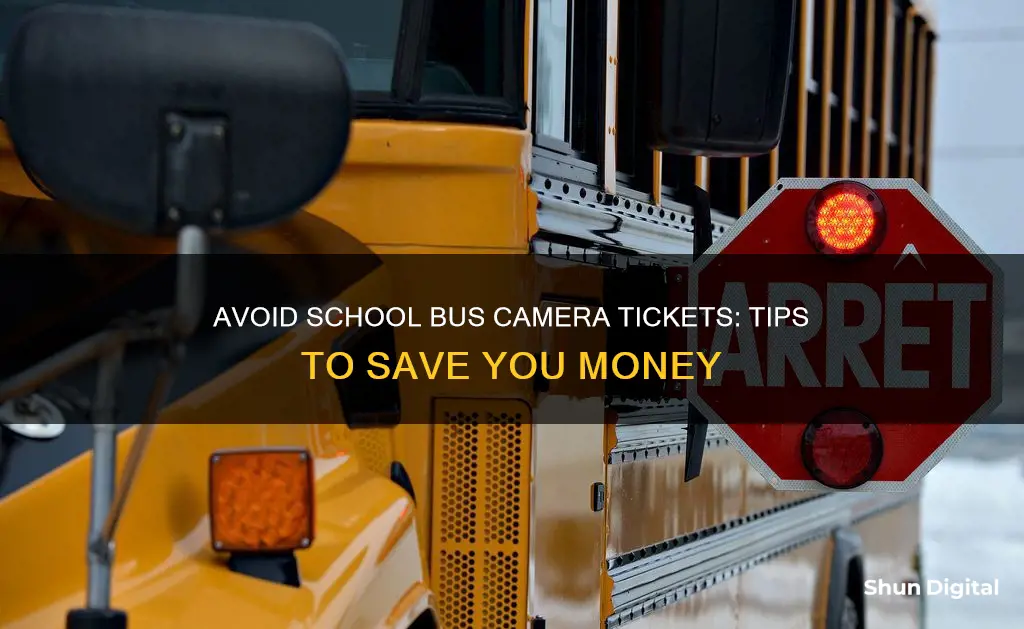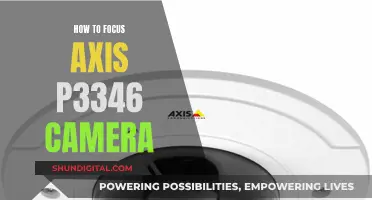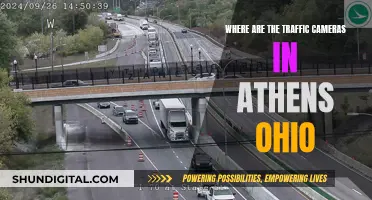
Getting a ticket for passing a school bus can be a confusing and frustrating experience. While the laws and penalties vary depending on your location, it's important to understand your rights and options when facing a school bus camera ticket. In some cases, you may be able to contest the ticket in court, especially if there are valid concerns about the safety of abruptly stopping on a busy road or if the bus driver did not follow proper procedures. However, it's essential to seek legal advice from a qualified attorney who can guide you through the specific rules and regulations in your area.
| Characteristics | Values |
|---|---|
| Ticket Issuer | Montgomery County’s Automated School Bus Enforcement Program, Cross Safe |
| Ticket Type | Civil violation similar to a parking violation |
| Payment Options | Online, by mail, by phone, or in person |
| Fine Amount | $250 |
| Registered Owner Responsibility | Yes |
| Points on Driver's License | No |
| Contesting Options | Request a hearing, provide a statement that you were not the driver, request a court date |
What You'll Learn

Paying the fine
If you have received a school bus camera ticket, you may be able to pay the fine online, by mail, by phone, or in person. The ticket is typically considered a civil violation, similar to a parking violation, and is not a criminal offense. The registered vehicle owner is responsible for the citation, and the violation will not be added to your driving record, nor will any points be put on your license.
The process for paying the fine may vary depending on your location, so be sure to check with your local authorities or the organization that issued the ticket. In some cases, you may be able to view the video evidence associated with the ticket online or by requesting it from the issuing organization. This can help you understand the circumstances of the violation and decide how to proceed.
If you choose to pay the fine, follow the instructions provided on the ticket or by the relevant authority. You will typically need to provide the complete citation number and, in some cases, your license plate number or other vehicle identification information. Accepted payment methods may include credit cards, checks, or money orders. Be sure to make the payment by the specified deadline to avoid any additional penalties or late fees.
It is important to note that paying the fine is often considered an admission of guilt. If you were not the driver at the time of the violation, you may have the option to provide a statement and identify the person who was driving. This process may involve completing and submitting specific forms or following other procedures specified by the relevant authority.
Alternative Options
While paying the fine may be a straightforward option, there are alternative paths you can consider:
- Request a Hearing or Court Date: In some jurisdictions, you may have the right to request a hearing or court date to contest the ticket. This allows you to present your case and potentially have the fine dismissed. However, be aware that there may be specific procedures and deadlines for requesting a hearing.
- Consult an Attorney: Depending on your circumstances, consulting a traffic attorney may be beneficial. An attorney can advise you on the potential legal implications, help you understand your options, and guide you through the process. They can also identify any issues with the process, the officer's report, or due process that could be used in your defense.
- Review the Evidence: If you have access to the video evidence, carefully review it to determine if there are any valid defenses or extenuating circumstances. For example, you may be able to argue that you did not have sufficient time to react and stop safely.
Converting Camera Raw to JPEG with Adobe Bridge
You may want to see also

Requesting a hearing
If you receive a ticket for passing a school bus, you may be able to request a hearing to dispute the ticket. Here are some steps and considerations for requesting a hearing:
- Review the Evidence: In most cases, you can access the video evidence of the alleged violation online or by contacting the relevant authority. Review the video carefully to understand the circumstances of the incident.
- Understand the Laws: Familiarize yourself with the specific laws and regulations regarding school bus stopping procedures in your state or locality. Look for specific requirements, such as the use of amber lights before stopping or the need to stop only on certain types of roadways.
- Identify Defenses: Based on your review of the evidence and the applicable laws, identify any potential defenses or mitigating circumstances. For example, you may argue that you did not have sufficient time to react and stop safely, or that the bus did not follow proper procedures.
- Act Promptly: In some jurisdictions, you may have a limited amount of time to request a hearing or dispute the ticket. Pay attention to any deadlines mentioned in the citation or on the official website.
- Submit a Request: Follow the instructions provided on the citation or the official website to submit your request for a hearing. In some cases, you may need to submit a written request by mail or online. Keep a copy of your completed form for your records.
- Consider Seeking Legal Advice: Depending on the complexity of your case and the potential consequences, you may benefit from consulting a lawyer. They can advise you on the strengths and weaknesses of your case and help you navigate the hearing process.
- Prepare for the Hearing: If your request for a hearing is granted, prepare your evidence and arguments for the hearing. You may need to present your case to a judge or an administrative body. Be prepared to explain why you believe the ticket should be dismissed or reduced.
- Understand Potential Outcomes: Be aware that the outcome of the hearing could go either way. The judge or administrative body may uphold the ticket, reduce the fine, or dismiss it entirely.
- Right to Appeal: If you are unsatisfied with the outcome of the hearing, you may have the right to appeal the decision. However, this process may vary depending on your location and the specific procedures in place.
Remember that the information provided here is general in nature, and specific laws and procedures may vary depending on your location. Always refer to the official sources and seek legal advice if needed.
Iron Cameras: Myth or Reality?
You may want to see also

Identifying the driver
If you are the registered owner of a vehicle that receives a school bus camera ticket, you are responsible for the citation, even if you were not driving the vehicle at the time of the incident. However, you may be able to identify the person who was driving and transfer the liability to them.
To do this, you will need to provide a statement swearing and affirming that the person named in the citation was the driver at the time of the violation. This statement must include the full name and address of the driver, as well as your daytime phone number, and it must be signed by you. All requests for a "Transfer of Liability" must be received no later than 30 days after the mail date of the citation.
You can send your request to the following address:
Automated Traffic Enforcement Unit
P.O. Box 10314
Gaithersburg, MD 20898
It is important to note that even if you identify the driver and transfer the liability, you may still be held responsible for the ticket if you gave the driver permission to use your vehicle, either explicitly or implicitly. In the case of a leased or rented vehicle, the registered owner has 37 days to provide a lease or rental agreement to authorities, after which the lessee or renter would be liable for the fine.
If you are unable to identify the driver or transfer the liability, you may still have options for contesting the ticket. You can request a hearing or court date to present your case and determine whether you were the driver at the time of the violation. A lawyer can help you navigate these processes and determine the best course of action for your specific situation.
Attaching a Mod Camera Strap: A Quick Guide
You may want to see also

Contesting the ticket
If you want to contest a school bus camera ticket, you can request a hearing. According to Maryland state law, the registered owner of the vehicle is responsible for the citation, but if you were not driving the vehicle, you can provide a statement that you were not the driver, along with the name and address of the person who was driving, and your contact number. This must be submitted no later than 30 days after the citation was issued.
Alternatively, you can request a contested hearing, where a judge will hear your case, as well as the prosecutor's, and decide whether you committed the traffic infraction. If you were driving the vehicle, there may be problems with the process by which the ticket was issued, or with the officer's report, that could be used to cast doubt on the investigation. There may also be due process problems with issuing a ticket to the registered owner rather than the individual who was driving. These issues can be difficult to argue without a good familiarity with case law, rules of evidence, and local jurisdiction, so it is advisable to seek the advice of an attorney before making a decision on your case.
Choosing the Right Batteries for Your Action Camera
You may want to see also

Seeking legal advice
If you've received a school bus camera ticket, you may be wondering if you should pay it or fight it. While it can be a stressful situation, there are a few things you can do to handle the ticket effectively and protect your rights. Here are some steps you can take to seek legal advice and resolve the issue:
- Understand the Nature of the Ticket: Start by understanding the nature of the ticket. In most cases, a school bus camera ticket is considered a civil violation similar to a parking violation. This means that paying the fine is an admission of guilt, and the violation typically won't be added to your driving record or affect your license.
- Review the Evidence: Request to view the video evidence of the alleged violation. You can usually do this by visiting a website provided by the local authorities or the company handling the automated traffic enforcement program. Carefully review the footage to identify any discrepancies or mitigating factors.
- Consult a Local Attorney: Consider consulting a local attorney who specializes in traffic violations or criminal defense. They can provide you with specific legal advice based on the laws in your state or county. An attorney can help you understand your rights, identify possible defenses, and guide you through the process of disputing the ticket if necessary.
- Explore Available Defenses: Depending on the circumstances, there may be valid defenses to challenge the ticket. For example, in some cases, it has been successfully argued that the video evidence does not clearly show that the vehicle in question is a school bus or that it was stopped for the purpose of loading or unloading children.
- Decide on a Course of Action: After consulting with an attorney and reviewing the evidence, decide on a course of action. You may choose to pay the fine if it is a civil violation and you want to avoid further complications. Alternatively, you may decide to dispute the ticket, especially if you believe there are strong grounds for doing so.
- Request a Hearing or Court Date: If you choose to dispute the ticket, follow the procedures outlined by your local authorities to request a hearing or court date. This typically involves submitting a request in writing within a specified timeframe. Make sure to gather any evidence and prepare your arguments in advance of the hearing.
- Provide a Statement if You Were Not the Driver: If you were not the one driving the vehicle at the time of the alleged violation, you may be able to transfer liability. Provide a statement swearing that you were not the driver and identifying the person who was operating the vehicle. Include their full name, address, and your contact information.
- Stay Organized and Document Everything: Throughout the process, stay organized and keep detailed records. Make copies of all correspondence, notes from conversations, and relevant documents. If you need to attend a hearing or court date, having a well-organized file can help support your case.
Remember, the specific laws and procedures may vary depending on your location. Always consult with a qualified attorney in your area to get personalized legal advice and ensure you are taking the appropriate steps to protect your rights.
Traffic Camera Tickets: Do You Have to Pay?
You may want to see also
Frequently asked questions
Tickets given by cameras are civil tickets, and are not criminal in nature. If you do not pay the ticket, it will likely be forwarded to a collection agency to pursue payment. These tickets are usually not like regular tickets where your driver's license is suspended or a warrant for your arrest is issued. However, failure to pay in a timely manner may cause the fine amount to double or triple.
You have the option of paying school bus tickets in four different ways: online, by mail, by phone, or in person.
School bus camera tickets are issued to the registered owner of the vehicle. If you were not the driver, you can provide a statement that you were not operating the vehicle at the time of the school bus infraction. If you were the driver, there may be problems with the process by which the ticket was issued or the officer's report that you can use to cast doubt on the investigation.







